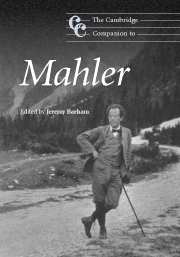Book contents
- Frontmatter
- Introduction: Marginalia on Mahler today
- PART ONE Cultural contexts
- PART TWO Mahler the creative musician
- 4 Juvenilia and early works: from the first song fragments to Das klagende Lied
- 5 Song and symphony (I). Lieder und Gesänge Volume 1, Lieder eines fahrenden Gesellen and the First Symphony: compositional patterns for the future
- 6 Song and song-symphony (I). Des Knaben Wunderhorn and the Second, Third and Fourth Symphonies: music of heaven and earth
- 7 Song and symphony (II). From Wunderhorn to Rückert and the middle-period symphonies: vocal and instrumental works for a new century
- 8 The ‘greatest’ and the ‘most personal’: the Eighth Symphony and Das Lied von der Erde
- 9 The last works
- PART THREE Mahler the re-creative musician
- PART FOUR Reception and performance
- Appendix: selected discography
- Notes
- Bibliography
- Index
4 - Juvenilia and early works: from the first song fragments to Das klagende Lied
from PART TWO - Mahler the creative musician
Published online by Cambridge University Press: 28 September 2011
- Frontmatter
- Introduction: Marginalia on Mahler today
- PART ONE Cultural contexts
- PART TWO Mahler the creative musician
- 4 Juvenilia and early works: from the first song fragments to Das klagende Lied
- 5 Song and symphony (I). Lieder und Gesänge Volume 1, Lieder eines fahrenden Gesellen and the First Symphony: compositional patterns for the future
- 6 Song and song-symphony (I). Des Knaben Wunderhorn and the Second, Third and Fourth Symphonies: music of heaven and earth
- 7 Song and symphony (II). From Wunderhorn to Rückert and the middle-period symphonies: vocal and instrumental works for a new century
- 8 The ‘greatest’ and the ‘most personal’: the Eighth Symphony and Das Lied von der Erde
- 9 The last works
- PART THREE Mahler the re-creative musician
- PART FOUR Reception and performance
- Appendix: selected discography
- Notes
- Bibliography
- Index
Summary
According to various sources, the compositions of Mahler's childhood and student years (up to 1880) were both numerous and generically diverse. In speculative ‘catalogues’, the well-documented abortive opera projects Herzog Ernst von Schwaben, Die Argonauten and Rübezahl are listed alongside less familiar or less credible references to four early symphonies, songs, song fragments, chamber and piano works (including the Polka mit einem Trauermarsch als Einleitung which Mahler ‘composed’ at the age of six or seven). That the vast majority of these ‘works’ have not survived is due partly to the fact that many, such as the piano pieces in ‘Wagnerian’ style which Mahler played in 1875 to his prospective piano professor Julius Epstein, were probably never notated. Of the remainder, including those works deriving from his three-year period of study at the Vienna Conservatoire (1875–8), nearly all either have been lost or were deliberately destroyed by the composer. According to Conservatoire records, Mahler won respectively a unanimous first prize for the ‘first movement of a quintet’ and a non-unanimous first prize for a ‘scherzo for piano quintet’ in the 1876 and 1878 composition competitions. Bauer-Lechner mentions a prize-winning piano suite and violin sonata, neither of which appears in Conservatoire records. According to Carl Hruby, Bruckner recalled a ‘symphonic movement’ replaced by an andante ‘sonata movement’ in an annual Conservatoire examination, while Richard Specht wrote of a prize-winning string quintet, Alma Mahler referred to ‘a movement of a quartet for a competition’, and Ludwig Karpath recounted that Mahler competed unsuccessfully in the Conservatoire's annual song competition (probably in either 1875–6 or 1876–7).
- Type
- Chapter
- Information
- The Cambridge Companion to Mahler , pp. 49 - 71Publisher: Cambridge University PressPrint publication year: 2007



